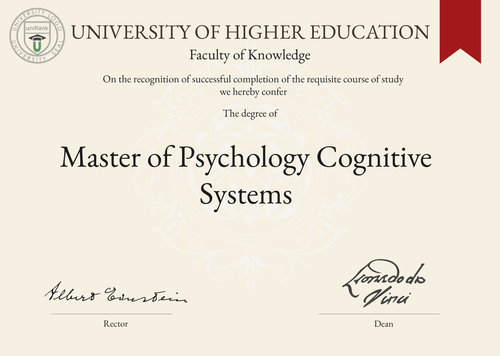
Master of Psychology Cognitive Systems (M.Psych.Cog.Sys.)
Guide to Master of Psychology Cognitive Systems Program/Course/Degree
Master of Psychology Cognitive Systems (M.Psych.Cog.Sys.)

Program Name:
Master of Psychology Cognitive SystemsProgram or Degree abbreviation:
M.Psych.Cog.Sys.Duration range:
2-3 yearsTuition range:
Varies by country and universityOverview:
The Master of Psychology Cognitive Systems program is designed to provide students with a comprehensive understanding of the cognitive processes underlying human behavior. This interdisciplinary program combines psychology, neuroscience and computer science to explore how the mind works and how it interacts with the environment.Curriculum Overview by year:
Year 1: - Introduction to Cognitive Psychology - Cognitive Neuroscience - Research Methods in Cognitive Systems - Cognitive Modeling - Elective Courses Year 2: - Advanced Topics in Cognitive Psychology - Neural Networks and Deep Learning - Cognitive Systems Design - Internship or Research Project - Elective CoursesKey Components:
- Cognitive Psychology: Gain a deep understanding of the fundamental principles and theories of cognitive psychology. - Cognitive Neuroscience: Explore the neural mechanisms underlying cognitive processes. - Cognitive Modeling: Learn how to develop computational models to simulate cognitive processes. - Neural Networks and Deep Learning: Understand the principles and applications of artificial neural networks and deep learning algorithms. - Cognitive Systems Design: Apply cognitive principles to design user-friendly and efficient systems.Career Prospects:
Graduates of the Master of Psychology Cognitive Systems program can pursue various career paths, including: - Researcher in academia or industry - User Experience (UX) Designer - Data Scientist - Cognitive Systems Analyst - Human-Computer Interaction SpecialistSalary Expectations:
Salary expectations for graduates of this program can vary depending on factors such as location, industry and level of experience. On average, professionals in this field can earn a competitive salary, with the potential for growth and advancement. For a more accurate understanding of salary expectations, you can utilize the Job Sites Search Engine, from our sister site jobRank, which searches over 4,600 job sites worldwide. Make sure to specify not only the job title but also the country you are interested in.Conclusions:
It is important to note that the duration, tuition fees, curriculum, key components, career prospects and salary expectations of the Master of Psychology Cognitive Systems program can vary based on the chosen country or location of study, as well as the chosen university. Prospective students are encouraged to research and compare different programs to find the best fit for their goals and aspirations. Visitors interested in pursuing a Master of Psychology Cognitive Systems degree can use the uniRank World Universities Search Engine to explore universities offering this program worldwide. This powerful search engine allows users to find and compare universities based on various criteria, including program availability, location and reputation.World Universities Search Engine
search for Master of Psychology Cognitive Systems (M.Psych.Cog.Sys.) and add the Location (country, state etc.) or specific University you are interested in studying at.
Query examples:
- Master of Psychology Cognitive Systems (M.Psych.Cog.Sys.) United States
- Master of Psychology Cognitive Systems (M.Psych.Cog.Sys.) United Kingdom online
- Master of Psychology Cognitive Systems (M.Psych.Cog.Sys.) Australia international students
- Master of Psychology Cognitive Systems (M.Psych.Cog.Sys.) University of California
- Master of Psychology Cognitive Systems (M.Psych.Cog.Sys.) University of London tuition fees
- Master of Psychology Cognitive Systems (M.Psych.Cog.Sys.) University of Sydney scholarships
Share Program/Course
Interesting? Share this program/course/degree info with your friends now.